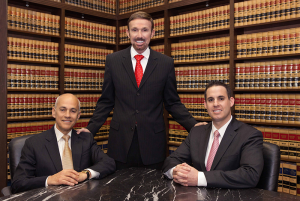Prostitution Crime FAQs – California Penal Code 647(b)
At Wallin & Klarich, we understand that you may have many questions when you have been charged with engaging in a prostitution crime. Therefore, we have provided you with answers to some frequently asked questions about the offense of engaging in prostitution crimes below.
1. Do I need to make a payment directly to the person performing the sexual act in order to be charged with a prostitution crime?
No. Under California Penal Code section 647(b)1, you do not have to make a direct payment to the person performing the sexual act in order to be charged with engaging in prostitution. You can still be charged with a prostitution crime even if you pay a third-party, such as a pimp.
Even if you pay the person performing the sexual act or the third-party, and you do not engage in any sexual act, you may be convicted of prostitution. This is because you have already agreed to engage in prostitution with the individual and your payment in exchange for the sexual acts is an act in furtherance of the act of prostitution. For example, if you pay a person who you believe to be a prostitute to have sexual intercourse with you, but that person is an undercover police officer posing as a prostitute and arrests you before you have intercourse, then you have already committed the act of a prostitution crime.
2. What sort of acts qualify as furthering the commission of prostitution if I am charged with agreeing to engage in prostitution crime?
Acts that qualify as furthering the commission of prostitution include:
- Arriving at the location where the sexual acts are to be performed;
- Possession of condoms or other items intended for the sexual act;
- Verbally commanding performance of some sexual act;
- Handing over the payment; or
- Withdrawing money from an ATM for the purpose of paying for sexual favors.
Your Wallin & Klarich attorney may be able to help you challenge whether your actions were actually in furtherance of the commission of prostitution. For example, possession of condoms alone may not indicate an act in furtherance of prostitution if you have always carried a condom in your wallet.
3. If I help a prostitute solicit customers, but do not engage in an act of prostitution crime, can I be prosecuted in California? (Penal Code section 266h)

Under California Penal Code section 266h2, it is illegal for someone to obtain the earnings of another person’s prostitution or to receive compensation for soliciting prostitution for another. This act is also known as pimping. Pimps usually act as the middleman who solicits customers for the prostitute.
A conviction for pimping is punishable by up to 6 years in state prison. If you are convicted of pimping a minor under the age of 16, then you could face up to 8 years in state prison and will be required to register as a sex offender under California Penal Code section 2903.
4. Can I be convicted of an offense if I encourage someone to engage in prostitution crime? (California Penal Code section 266i)
Under California Penal Code section 266i4, it is illegal for someone to persuade or encourage another person to become a prostitute. This is also known as pandering. Unlike the offense of pimping, you do not need to receive money to be convicted of pandering. If you encouraged or persuaded another person to engage in prostitution and made that person available for the purpose of prostitution, then you may be convicted of pandering.
A conviction for pandering is punishable by up to 6 years in state prison. If you are convicted or pimping or pandering a minor under the age of 16, you face up to an additional 2 years in state prison. You will be required to register as a sex offender if you are convicted of pandering a minor under the age of 16. (Penal Code section 290).
5. If I am convicted of a prostitution crime, will I be required to register as a sex offender?

Not necessarily. Although a violation of Penal Code Section 647(b) does not automatically require you to register as a sex offender pursuant to California Penal Code Section 290, a judge may decide to require that you register as a sex offender. Under California Penal Code section 290.006, the judge has discretion to order that you register as a sex offender if the judge finds that you committed the offense as a result of sexual compulsion or for the purposes of sexual gratification.
6. What other crimes are charged in connection with prostitution crime in California?
If the act of prostitution occurs in a public place, or if the agreed-upon act of prostitution occurs in a public place, then you may also be charged with lewd conduct in public in violation of California Penal Code section 647(a). Even if you engage in an act of prostitution in a locked car, the prosecutor may charge you with lewd conduct in public because the car is in a public area where someone who was offended by the conduct may be present.
Moreover, you may be convicted of loitering to commit prostitution if you stand on a street corner known for prostitution and wave at cars with the intent to solicit another for prostitution. Unlike the offense of engaging in prostitution, loitering to commit prostitution under California Penal Code section 653.225 does not require that law enforcement officers witness an agreement to engage in prostitution.
The fact that you were loitering and had the specific intent to engage in prostitution is enough for a conviction under California Penal Code section 653.22. If you were only waving at cars while wearing a skimpy outfit, then the prosecutor will likely not be able to prove that you had the specific intent to engage in prostitution.
7. Where can I find an experienced criminal defense attorney to represent me in my prostitution crime case?

Being accused of engaging in prostitution is difficult and stressful. At Wallin & Klarich, our attorneys have over 40 years of experience successfully defending our clients who are facing charges for prostitution. We have the skill and knowledge that is required to help you win your prostitution case. Because of our decades of experience, we can help you raise the legal defenses that will most likely help you achieve the best possible outcome in your case.
Our offices are conveniently located in Orange County, Los Angeles, San Diego, Riverside, San Bernardino, Ventura, West Covina, Victorville, Torrance, and Sherman Oaks. Call us today at (877) 4-NO-JAIL or (877) 466-5245. We will be there when you call.
1. Penal Code Section 647(b): http://law.onecle.com/california/penal/647.html↩
2. Penal Code Section 266(h): http://law.onecle.com/california/penal/266h.html↩
3. Penal Code Section 290: http://law.onecle.com/california/penal/290.html↩
4. Penal Code Section 266(i): http://law.onecle.com/california/penal/266i.html↩
5. Penal Code Section 653.22: http://law.onecle.com/california/penal/653.2.html↩

